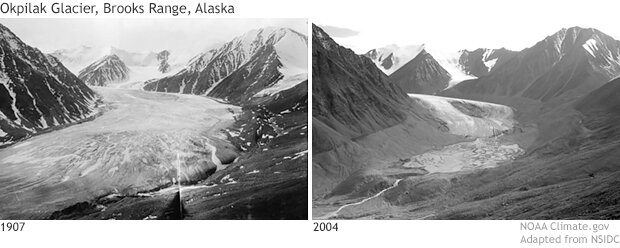Can historical temperature data records be trusted? Haven't they been skewed by non-climate factors like instrument changes and "urban heat islands"?
Yes, we can trust NOAA's Global Historical Climatology Network (GHCN) data for three key reasons:
- NOAA uses quality control measures to ensure the temperature data are of the highest quality and accuracy for research purposes. NOAA is open and transparent about its quality control measures and anyone can read all about them in the published literature or on the NOAA website. Learn more.
- Both the temperature data record and NOAA’s analyses of the temperature data have been peer-reviewed by other, independent teams of scientists in the U.S. and internationally. No reasons have been found to question the integrity or the quality of the GHCN dataset. Learn more here and here and here.
- Perhaps most compelling reason: Mother Nature herself offers many lines of corroborating evidence that our world is warming—from melting ice sheets and glaciers, to the rising global sea level, to the earlier arrival of spring and longer warm seasons, to plant and animal species migrations. It is easy to conclude our world is warming even without the GHCN data. Learn more.

The marked retreat of Okpilak Glacier in Brooks Range, Alaska, is one example of glacier retreat worldwide. Images from the National Snow and Ice Data Center (NSIDC) Glacier Photograph Collection.
References
NOAA National Centers for Environmental Information, State of the Climate: Global Climate Report for Annual 2019, published online January 2020, retrieved on June 18, 2020, from https://www.ncdc.noaa.gov/sotc/global/201913.
Peterson, T.S. and R.S. Vose (1997): "Historical Climatology Network Temperature Database." Bulletin of the American Meteorological Society (BAMS). v78, no. 12, pp. 2837-49.
Hansen, J.E., R. Ruedy, M. Sato, M. Imhoff, W. Lawrence, D. Easterling, T. Peterson, and T. Karl (2001): "A closer look at United States and global surface temperature change." Journal of Geophysical Research, 106, 23947–23963. doi:10.1029/2001JD000354.
Menne, M.J., C.N. Williams, Jr., and M.A. Palecki (2010): "On the Reliability of the U.S. Surface Temperature Record." Journal of Geophysical Review: Atmospheres. V115, no. D11. DOI: 10.1029/2009JD013094
Morice, C.P., J.J. Kennedy, N.A. Rayner, and P.D. Jones (2012): "Quantifying uncertainties in global and regional temperature change using an ensemble of observational estimates: The HadCRUT4 data set." Journal of Geophysical Research: Atmospheres. v117, no. D8. DOI: 10.1029/2011JD017187
Menne, M.J., C.N. Williams, Jr., and R.S. Vose (2009): "The U.S. Historical Climatology Network Monthly Temperature Data, Version 2." Bulletin of the American Meteorological Society (BAMS). 90, 993–1007. doi: http://dx.doi.org/10.1175/2008BAMS2613.1
Menne, M.J. and C.N. Williams, Jr. (2009): "Homogenization of Temperature Series via Pairwise Comparisons." Journal of Climate, v22. DOI: 10.1175/2008JCLI2263.1
National Fish, Wildlife, and Plants Climate Adaptation Partnership (2012): National Fish, Wildlife, and Plants Climate Adaptation Strategy. Association of Fish and Wildlife Agencies, Council on Environmental Quality, Great Lakes Indian Fish and Wildlife Commission, National Oceanic and Atmospheric Administration, and U.S. Fish and Wildlife Service. Washington, D.C. DOI: 10.3996/082012-FWSReport-1
IPCC. (2018). Global Warming of 1.5°C. An IPCC Special Report on the impacts of global warming of 1.5°C above pre-industrial levels and related global greenhouse gas emission pathways, in the context of strengthening the global response to the threat of climate change, sustainable development, and efforts to eradicate poverty [Masson-Delmotte, V., P. Zhai, H.-O. Pörtner, D. Roberts, J. Skea, P.R. Shukla, A. Pirani, W. Moufouma-Okia, C. Péan, R. Pidcock, S. Connors, J.B.R. Matthews, Y. Chen, X. Zhou, M.I. Gomis, E. Lonnoy, T. Maycock, M. Tignor, and T. Waterfield (eds.)]. World Meteorological Organization, Geneva, Switzerland, 32 pp. https://www.ipcc.ch/sr15/ (accessed June 18, 2020).
IPCC (2019). Summary for Policymakers. In: IPCC Special Report on the Ocean and Cryosphere in a Changing Climate. [H.-O. Pörtner, D.C. Roberts, V. Masson-Delmotte, P. Zhai, M. Tignor, E. Poloczanska, K. Mintenbeck, A. Alegría, M. Nicolai, A. Okem, J. Petzold, B. Rama, N.M. Weyer (eds.)]. In press.